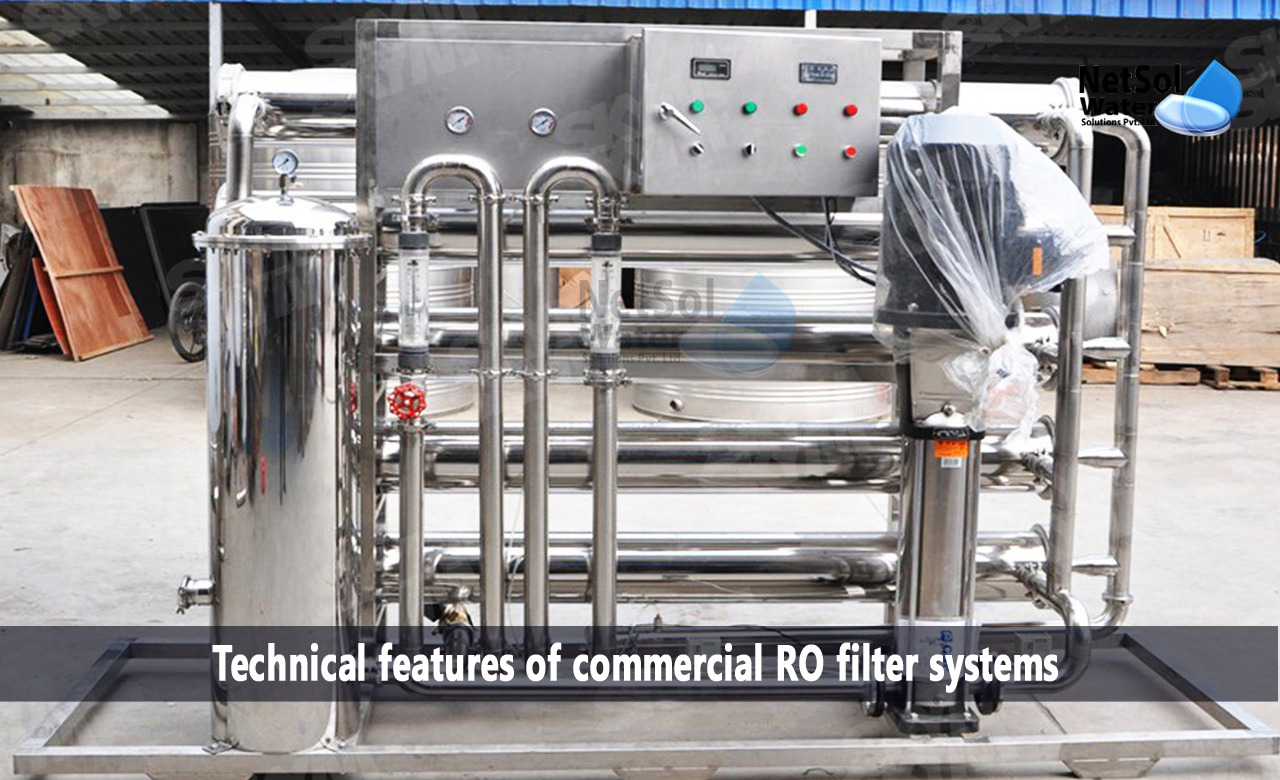Technical features of a commercial RO plant refer to the specifications and capabilities of the system's components and subsystems. Some key technical features that are important for a commercial RO plant include the capacity of the system, the quality of the membranes and filters used, the type of pre-treatment and post-treatment systems, and the level of automation and control.
Capacity is a critical technical feature because it determines the amount of water that the system can process per day. Membrane and filter quality are also important because they determine the effectiveness of the system in removing impurities and contaminants from the water. Pre-treatment and post-treatment systems are crucial to ensure that the water is properly treated before and after it passes through the membranes.
Automation and control features are also important for commercial RO plants because they can help to optimize the performance of the system and reduce the risk of downtime or system failure. For example, automated monitoring and control systems can detect and respond to changes in water quality or system performance, allowing for timely adjustments or repairs.
Let's discuss in detail the various technical features of commercial RO plant.
What are the technical features of commercial RO filter systems?
Commercial RO filter systems typically have several technical features that are designed to improve their performance and functionality. Some of the common technical features of commercial RO filter systems include:
1. Pre-treatment: Commercial RO filter systems often include pre-treatment stages to remove larger particles, sediment, and other impurities from the water before it enters the RO membrane. Pre-treatment stages may include filtration, sedimentation, or other processes to protect the RO membrane and improve its longevity.
2. High-pressure pump: Commercial RO filter systems typically require a high-pressure pump to push the water through the RO membrane. The pump must be able to maintain a constant pressure and flow rate to ensure optimal performance of the RO system.
3. RO membrane: The RO membrane is the heart of the RO filter system, and its quality and performance are critical to the overall effectiveness of the system. Commercial RO filter systems often use high-quality RO membranes made of materials such as polyamide, cellulose acetate, or thin-film composite.
4. Control panel: A control panel is often included in commercial RO filter systems to allow users to monitor and adjust the system parameters, such as pressure, flow rate, and temperature.
5. Automatic shut-off valve: An automatic shut-off valve is typically included in commercial RO filter systems to prevent damage to the RO membrane in case of low feed water pressure or other system issues.
6. Storage tank: Commercial RO filter systems may include a storage tank to hold the treated water before it is used or distributed. The tank should be made of high-quality materials and designed to prevent contamination or other issues.
Overall, the technical features of commercial RO filter systems are designed to ensure optimal performance, reliability, and longevity, while providing high-quality purified water for various applications.
The importance of technical characteristics in commercial RO filter systems:
The technical features of commercial RO filter systems are important for several reasons:
(1) Performance: The technical features of commercial RO filter systems are critical to the overall performance of the system. High-quality components such as the RO membrane, high-pressure pump, and control panel can ensure that the system operates at peak efficiency and delivers high-quality purified water.
(2) Reliability: The reliability of commercial RO filter systems is essential for ensuring uninterrupted operation and minimizing downtime. High-quality components and robust design features can reduce the risk of system failure or breakdowns, which can be costly and disruptive to business operations.
(3) Longevity: Commercial RO filter systems are a significant investment, and it is important to ensure that the system lasts for many years with minimal maintenance or repair costs. High-quality components and design features can improve the longevity of the system and reduce the need for frequent replacements or repairs.
(4) Water Quality: The technical features of commercial RO filter systems can play a significant role in ensuring the quality of the treated water. Pre-treatment systems, automatic shut-off valves, and storage tanks can all help to prevent contamination and ensure that the water meets the desired specifications.
Do you need an advice or assistance on selecting the best water and waste water treatment unit? We have solutions for all your problems!
Let us now your problem, our experts will make sure that it goes away.
For an assistance or related query,
Call on +91-965-060-8473
Or write us at enquiry@netsolwater.com



